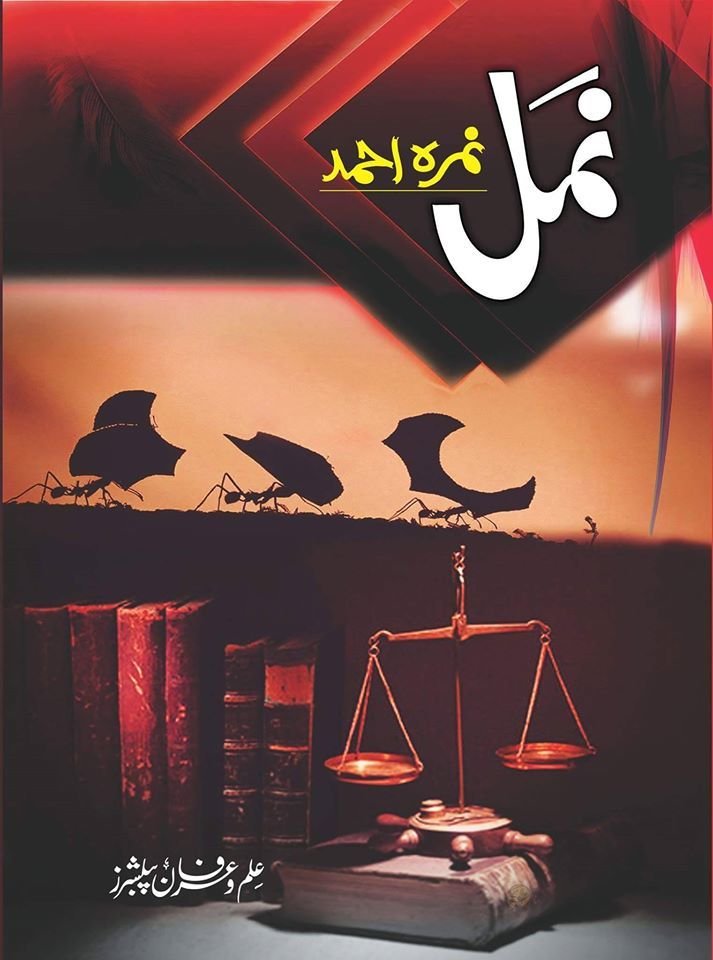
Introduction
“Namal” is an extraordinary Urdu novel penned by the talented Nimra Ahmed. It stands as a remarkable piece of literature that has captivated readers with its intricate plot, complex characters, and profound themes. The novel is not just a story but a reflection of societal issues, human emotions, and ethical dilemmas. This essay aims to provide an in-depth analysis of “Namal,” exploring its storyline, characters, themes, and the significant impact it has made on Urdu literature and its readers.
Namal (Nimra Ahmad)-pdf-Download-(pantherbolt.com)
Author Background: Nimra Ahmed
Nimra Ahmed is a celebrated name in contemporary Urdu literature. Born in Pakistan, Nimra’s passion for writing emerged at a young age. She pursued her studies in English Literature, which further honed her writing skills. Her journey as an author began with short stories and novellas, gradually transitioning to full-length novels that have since become bestsellers.
Nimra Ahmed’s writing is distinguished by her ability to weave intricate plots with deep emotional and philosophical undertones. Her works often draw inspiration from Islamic teachings and the Quran, providing a unique blend of spirituality and modern-day dilemmas. Through her compelling narratives and relatable characters, she has managed to create a significant impact on her readers, encouraging them to reflect on their lives and societal values.
Plot Summary of “Namal”
“Namal” is an epic saga that spans across several volumes, each filled with suspense, drama, and unexpected twists. The novel begins with the murder of Saadi Yousuf’s parents, which sets off a chain of events that intertwine the lives of several characters. The central plot revolves around Faris Ghazi, a former intelligence officer wrongfully accused of the murders, and his quest to prove his innocence.
As the story unfolds, we are introduced to Zumar Yousuf, Saadi’s elder sister, who becomes an integral part of Faris’s journey. Zumar is a strong, determined woman who seeks justice for her family while grappling with her personal struggles. Her relationship with Faris evolves from distrust to partnership, and eventually, a deep bond forms between them.
Hashim Kardar, the antagonist, is a wealthy and influential man whose manipulations and deceitful tactics add layers of complexity to the narrative. His character embodies corruption and power, making him a formidable adversary to Faris and Zumar.
The plot thickens with each chapter, revealing secrets, betrayals, and the underlying motives of each character. The story is a masterful blend of action, emotion, and intellect, keeping readers on the edge of their seats until the very end.
Main Characters
- Faris Ghazi Faris is the protagonist whose life takes a drastic turn after being falsely accused of murder. His character is a blend of strength, intelligence, and resilience. Faris’s journey from a disgraced officer to a man seeking redemption is both inspiring and heart-wrenching.
- Zumar Yousuf Zumar is a central figure in the novel, known for her unwavering determination and moral integrity. Her relationship with her brother Saadi and her evolving bond with Faris add depth to her character. Zumar’s pursuit of justice and truth makes her a compelling and relatable character.
- Saadi Yousuf Saadi is a young man whose life is shattered by the murder of his parents. His character represents innocence and vulnerability. Throughout the novel, Saadi’s growth and his quest for justice are pivotal to the storyline.
- Hashim Kardar Hashim is the primary antagonist, whose cunning and ruthless nature drive much of the conflict in the story. His character is a stark representation of power and corruption, making him a formidable enemy to Faris and Zumar.
- Supporting Characters The novel is rich with supporting characters who add layers to the narrative. Each character, from Faris’s loyal friends to Zumar’s confidantes, plays a crucial role in advancing the plot and adding depth to the story.
Themes and Motifs
- Justice and Revenge One of the central themes of “Namal” is the quest for justice. Faris’s determination to clear his name and Zumar’s pursuit of the truth highlight the importance of justice in society. The novel also explores the destructive nature of revenge, as seen in the actions of various characters.
- Family and Loyalty The bonds of family and the concept of loyalty are recurring motifs in the novel. The Yousuf family’s struggle for justice and Faris’s loyalty to his loved ones underscore the significance of familial ties and the sacrifices made for loved ones.
- Power and Corruption Hashim Kardar’s character embodies the theme of power and corruption. The novel delves into how power can corrupt individuals and the lengths they will go to maintain their influence. It also highlights the impact of corruption on society and individuals.
- Fate and Destiny The concept of fate and destiny plays a crucial role in the narrative. The characters’ lives are intertwined in ways that suggest a higher power at work, reflecting the belief that everything happens for a reason.
- Love and Sacrifice Love, in its various forms, is a significant theme in “Namal.” From familial love to romantic relationships, the novel portrays the power of love and the sacrifices made in its name. Zumar and Faris’s evolving relationship is a testament to the strength of love and commitment.
Literary Analysis
Nimra Ahmed’s narrative style in “Namal” is both engaging and thought-provoking. Her use of suspense and mystery keeps readers hooked, while her deep philosophical insights encourage them to reflect on their own lives. The novel is rich with symbolism and metaphors, adding layers of meaning to the story.
The Quranic inspirations in “Namal” are evident in the themes and moral dilemmas faced by the characters. Nimra Ahmed skillfully integrates these elements into the narrative, making the novel not just a story but a reflection of spiritual and ethical teachings.
Cultural and Social Context
“Namal” is a mirror of Pakistani society, highlighting various social issues such as corruption, injustice, and the struggle for power. The novel addresses these issues through its characters and their experiences, encouraging readers to think critically about the world around them.
The moral and ethical dilemmas faced by the characters are relatable to readers, as they reflect common challenges in society. The novel’s portrayal of strong, independent women like Zumar also adds a progressive dimension, challenging traditional gender roles and stereotypes.
Critical Reception
“Namal” has received widespread acclaim from readers and critics alike. Its gripping storyline, well-developed characters, and profound themes have made it a favorite among Urdu literature enthusiasts. The novel’s popularity is evident from its high sales and the numerous discussions and reviews it has generated.
Critics have praised Nimra Ahmed’s storytelling abilities and her skillful integration of Islamic teachings into the narrative. The novel has also been recognized for its impact on readers, encouraging them to reflect on their own lives and values.
Impact and Legacy
The impact of “Namal” extends beyond its literary success. The novel has inspired a new generation of readers and writers, encouraging them to explore complex themes and moral dilemmas in their works. Its success has also paved the way for more Urdu novels to gain recognition and appreciation.
“Namal” has been adapted into various media forms, including audio books and television dramas, further extending its reach and influence. Its themes of justice, love, and sacrifice continue to resonate with readers, ensuring its longevity and relevance.
Conclusion
“Namal” is a masterpiece of Urdu literature, offering a compelling blend of mystery, drama, and philosophical insights. Nimra Ahmed’s skillful storytelling and deep understanding of human emotions make the novel a profound and engaging read. The novel’s impact on readers and its significant contribution to Urdu literature ensure that it will be remembered and cherished for years to come.
In conclusion, “Namal” is not just a novel; it is a reflection of societal values, a quest for justice, and a testament to the power of love and resilience. Nimra Ahmed has created a literary gem that continues to inspire and captivate readers, solidifying her place as one of the most influential writers in contemporary Urdu literature.
This essay covers the essential aspects of “Namal,” providing a comprehensive analysis that is both informative and engaging. For full SEO optimization, additional keywords related to “Namal,” “Nimra Ahmed,” “Urdu literature,” and specific themes or characters could be strategically placed throughout the essay.

